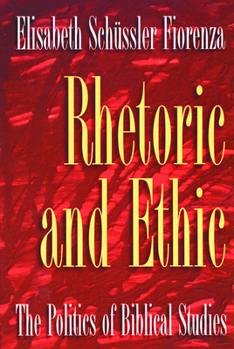Rhetoric and Ethic: The Politics of Biblical Studies
Select Format
Select Condition 
Book Overview
In this major study, leading feminist biblical critic Elisabeth Schussler Fiorenza focuses on Paul and his interpreters. She questions the apolitical ethos of biblical scholarship and argues for an alternative rooted in a critical understanding of language as a form of power. Modern biblical criticism, she reasons, derives much of its methodology and inspiration from an outdated notion of modern science. It professes value-neutrality and detachment...
Format:Paperback
Language:English
ISBN:0800627954
ISBN13:9780800627959
Release Date:November 1999
Publisher:Fortress Press
Length:232 Pages
Weight:0.85 lbs.
Dimensions:0.6" x 6.0" x 8.9"
Customer Reviews
1 rating
Essential Reading
Published by Thriftbooks.com User , 21 years ago
A discussion of ethics as language and language as power should be a component of any introductory course on ethics as well as a substantive part of any discussion of contemporary ethics. "Rhetoric and Ethic" makes a significant contribution to that discussion, particularly the emerging field of constructivist ethics. While it may prove too difficult for the undergraduate reader, instructors of theology and ethics at all levels should be thoroughly familiar with its claims and able to incoprporate them into class discussions.This book is a challenge to the still largely unquestioned assumption that biblical ethics can only be understood as a form of moral realism or ontological ethics. It also challenges current trends in social ethics that assume that justice means only one thing with obvious demands. Values are not universally understood to mean the same thing or require the same things of us. "Rhetoric and Ethic" gives theologians and others interested in formulating shared commitments without the trap of assumed universality an invaluable tool.





